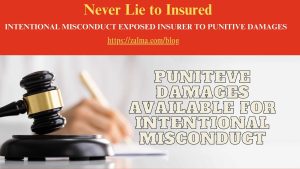Never Lie to Insured

An extra today because I’ll be unable to post tomorrow.
See the full video at https://rumble.com/v386rg0-never-lie-to-insured.html and at https://youtu.be/DZtRvpwKH9A
Susanne Cook (“Appellant”) appealed the trial court’s denial of her motion for leave to amend her complaint to assert a claim for punitive damages against Florida Peninsula Insurance Company (“the Insurance Company”). In Susanne Cook v. Florida Peninsula Insurance Company, No. 5D22-2334, Florida Court of Appeals, Fifth District (August 11, 2023) the Court of Appeals resolved the dispute.
BACKGROUND
Following the conclusion of a first-party lawsuit for windstorm insurance benefits, Appellant filed a motion for leave to amend to assert a claim for punitive damages, and a proposed amended complaint alleging bad faith by the Insurance Company.
The Insurance Company allegedly ignored information in its own file confirming coverage for her claim, used faulty data when it denied the claim, failed to conduct a proper investigation of the claim, misrepresented the policy and coverages afforded under the policy, and refused to issue payment for coverage under the policy to restore the property to its pre-loss condition.
Appellant claimed she suffered actual damages including but not limited to attorney’s fees, public adjuster’s fees, expert fees, loss of use and decrease in value of her property, loss of enjoyment of her property, damaged credit, and general damages.
She supported her claim because the Insurance Company-as a business practice-misrepresented pertinent facts or insurance policy provisions relating to coverages at issue, intentionally omitted language to mislead insureds and avoid paying claims and failed to properly investigate claims.
Appellant provided examples of three other similar claims. Appellant presented copies of letters from the Insurance Company to two other insureds that were similar in substance to that which it sent to Appellant-denying coverage and misrepresenting the terms of their policies by changing and omitting the language that would trigger coverage. In the third example, Appellant presented excerpts from the deposition testimony of a corporate representative of the Insurance Company stating it did not retain an engineer to properly inspect reported damage on another claim prior to denying coverage.
The trial court found there had to be a showing of frequency of a general business practice of more than three other claims for punitive damages to be asserted and that the Insurance Company’s misrepresentation was a mistake. The trial court denied Appellant’s motion for leave to amend her complaint to assert a claim for punitive damages.
ANALYSIS
A rigorous standard is applied to a motion for leave to amend a complaint to assert a punitive damages claim. Before allowing a punitive damages claim to satisfy his initial burden by means of a proffer, the statute contemplates that a claimant might obtain admissible evidence or cure existing admissibility issues through subsequent discovery.
Punitive damage amendments by statute the burden of proof at trial and provides that a defendant may be held liable for punitive damages only if the trier of fact, based on clear and convincing evidence, finds that the defendant was personally guilty of intentional misconduct or gross negligence.
It is not whether the wrongful business practice has already been proven, but whether the plaintiff made a sufficient showing by evidence in the record or proffer to establish a reasonable basis for it to ultimately be found that the defendant engaged in the wrongful conduct as a business practice.
What is required is a reasonable showing by evidence in the record or proffered by the claimant which would provide a reasonable basis for recovery of such damages. The appellate court concluded that Appellant’s actual evidence and proffered evidence reasonably demonstrated an indication that the Insurance Company misrepresented coverage and failed to properly investigate claims as a general practice, in reckless disregard for the rights of its insureds.
“Intentional misconduct” means that the defendant had actual knowledge of the wrongfulness of the conduct and the high probability that injury or damage to the claimant would result and, despite that knowledge, intentionally pursued that course of conduct, resulting in injury or damage.
The Court of Appeals concluded that there were reasonable inferences and sufficient circumstances submitted to plead intentional misconduct. The trial court was required to determine whether Appellant offered reasonable evidence of a misrepresentation, not whether the mistake was intentional. The trial court erroneously made a factual determination at the pleading stage. The trial court’s order was reversed.
There is no excuse for an insurer to lie to the insured. If, as alleged, the insurer intentionally lied to the insured about available coverages and did so as part of a normal business practice to at least three more insureds, it can be subject to punitive damages in Florida. If the Appellant proves her allegations the insurer will be punished for its wrongdoing.
 (c) 2023 Barry Zalma & ClaimSchool, Inc.
(c) 2023 Barry Zalma & ClaimSchool, Inc.
Please tell your friends and colleagues about this blog and the videos and let them subscribe to the blog and the videos.
Subscribe to Excellence in Claims Handling at locals.com https://zalmaoninsurance.locals.com/subscribe.
Subscribing to my publications at substack at https://barryzalma.substack.com/publish/post/107007808
Go to Newsbreak.com https://www.newsbreak.com/@c/1653419?s=01
Follow me on LinkedIn: www.linkedin.com/comm/mynetwork/discovery-see-all?usecase=PEOPLE_FOLLOWS&followMember=barry-zalma-esq-cfe-a6b5257
Daily articles are published at https://zalma.substack.com. Go to the podcast Zalma On Insurance at https://podcasters.spotify.com/pod/show/barry-zalma/support; Go to Barry Zalma videos at Rumble.com at https://rumble.com/c/c-262921; Go to Barry Zalma on YouTube- https://www.youtube.com/channel/UCysiZklEtxZsSF9DfC0Expg; Go to the Insurance Claims Library – https://zalma.com/blog/insurance-claims-library
Like this:
Loading…







